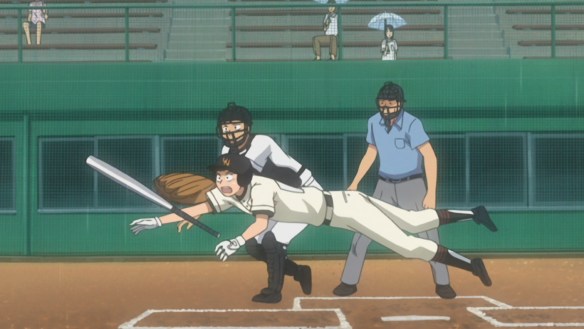Hello folks, and welcome back to Wrong Every Time. Today we’re diving back into the action of the summer tournament’s opening game, as first-seeded favorites Tosei find themselves on the backfoot against our scrappy boys from Nishiura. Though outgunned in terms of experience and pure athleticism, Nishiura have been exploiting every possible advantage to eke out a two-run lead, most recently acquiring a run via a smartly aimed bunt and a desperate squeeze play.
As has come to be expected from Big Windup!, every gambit and shift in fortunes has been expertly articulated by both the characters and the production itself. After spending its first act honing in on the physical and psychological constraints of Nishiura’s players, this story has proven itself an exemplar of mechanically grounded conflict, using the solidity of its baseline variables to make the tactical brilliance of its characters shine. There’s no deus ex machina or “I gotta dig deeper” power-ups here; only the satisfying interplay of smart players manipulating a complex board state, a rarified appeal that only a few mangaka can execute. Well, Asa Higuchi is clearly one such mangaka, and Tsutomu Mizushima is possibly the single best choice for bringing that style of conflict to life. Let’s get back to the game as Mihashi celebrates his first run!
Episode 19
We open with a brief recap of that last run acquired, which makes sense, given that this misplay by Takase will be the psychological weight hanging over this episode. Nishiura set a trap for him specifically, and knowing he fell into it will likely impact his confidence
The cheering cuts entirely as Mihashi goes to get some water, with the pouring spout and Mihashi’s heavy breathing dominating the sound design. The overall effect emphasizes Abe’s fear prior to Mihashi’s at-bat – that he is exhausting himself on offense, and won’t have the gas left to pitch his way through the rest of the innings
For once, he doesn’t actually work himself up over questions of how he should be acting, thinking instead “it’s okay as long as I can pitch.” After all the commotion of his run, he finds himself alone with his thoughts, and at last is actually comfortable with himself
“Why run when you can’t practice pitching without me?” As always, it falls to Abe to mind his partner’s behavior, juggling the twin needs of preserving his strength while allowing him to bask in the rush of victory
Mihashi’s increasing confidence is then demonstrated through his ease in practicing some throws with Tajima. He’s used to essentially hiding behind Abe rather than directly addressing his other teammates, but that last run really facilitated his progress in seeing his teammates as trusted allies, not judgmental onlookers
And of course, that initiates a positive feedback loop – a friendly, confident pitcher will inspire more trust and confidence in his teammates
Tosei’s first batter makes a clean strike and takes first. Already on the backfoot
Abe is careful not to fall into the same trap he employed the last inning, instead guiding the opposing players’ bunts towards areas where the ball can still bounce. As long as Mihashi throws somewhat outside, the angle the batter will be forced to take in order to bunt will basically guarantee the ball heads towards first, where the ground is still stable
Thus the runner on first advances to second, but the bunt is indeed a sacrifice play
“They’re now more focused on hitting grounders than in the early stage of the game.” This makes sense for multiple reasons – first, they’ve learned their opponents are stronger than expected, and that they won’t be able to win on big swings that earn runs singlehandedly. Beyond that, they’ve also learned the limitations of Nishiura, and that they can pick up consistent base hits just by waiting for Mihashi’s easier pitches and gunning it through the infield. They’re playing smarter now, picking up advantage one base hit at a time, and creating situations where any lucky hit equates to multiple runs
Abe reflects that their breaking balls are becoming too predictable. They’ll have to switch to the fastball, but that risks cleaner connecting hits, and of course Mihashi’s biggest weakness is his low pitching speed. If a fastball can’t actually stump the batter, you’re just serving them a perfect hit opportunity
Mihashi continues his unintentional psychological war on whoever’s on third base, turning to them as if asking for approval before pitching
Two fastballs fail to make Tosei’s coach take the bait, as he instructs his batter to still wait for that curveball. To his credit that the two-run deficit isn’t affecting his temperament; the right play remains the right play
The batter swinging desperately at a third fastball leads into an easy out, but the damage is done – the runner on third makes it home. A run far more significant than just a deduction of their lead, as it’s the first time Tosei has drawn blood all game. If this hurts Nishiura’s momentum, they’re in real trouble
And of course, the coach is still mad – he wasn’t supposed to swing at fastballs and give up outs, even if that resulted in a run
Abe sees Mihashi lying down after the inning and immediately thinks “now our summer’s over.” Cold shit, Abe
The moms are even worse! Mihashi’s mom notices his nosebleed and immediately starts riffing with the other moms about “boys that age.” Ruthless audience here
Whew, apparently one of the other first round games is at nine-zero by the end of the fifth. I imagine that’s about what Nishiura were expecting
Oh man, nice to see Tajima realizing his importance as an information scouter. The moment he hears Takase warming up he runs to the side of the dugout, eager to see how the rain and pressure are precisely affecting Takase’s pitches. If he can see what pitches are disallowed by the rain, that’ll really improve Nishiura’s batting chances
Higuchi’s doing an excellent job of conveying an underdog match here, and a big part of that comes from the deliberate restrictions he’s placed on Tosei. Takase started in a funk, and as soon as he hit his stride the rain began to limit his pitches – if not for those significant handicaps, this would not be a close game
As Abe calculates Mihashi’s remaining ability, he is again flustered by Mihashi offering him support. Both of them have their own brand of trust issues
“As soon as we let down our guard, they’ll eat us up instantly!” Momoe emphasizes one of the fundamental truths of baseball – games are close and low-scoring until they suddenly aren’t, when a pitcher plays past their ability and the runs start stacking. Another reason it’s an awkward spectator sport, as most of the jockeying for position that makes up the game’s meaningful back-and-forth isn’t really represented on the scoreboard
With his Takase-attuned eyes, Tajima has no trouble stealing second. Unfortunately, Takase otherwise cleans up the batters and earns three outs without issue
Even Hamada catches himself thinking “it’s a miracle we’re leading,” a bad sign for the team’s lead hype man
Abe’s being forced to try out more of Mihashi’s riskier pitches, but Tosei’s strategy remains the same: wait for the curveball and nail it safely every time
Of course, if you do that for two innings straight, a catcher as sharp as Abe will swiftly notice. Thus baseball becomes something of a sparring match in slow motion, with teams introducing countermeasures and counter-countermeasures inning by inning
“He’s good enough that everyone can accept his right to go after whatever pitches he wants.” A key distinction between the two teams – Tosei is brimming with individual aces, whose talents can be prioritized over a total team strategy. That makes it much harder for Abe to develop countermeasures, since he can’t be sure all his opponents are following the same script
Oh wow. Abe tells them to cover their mouths during a time-out, worried that an opposing player might actually read their lips. Every piece of information is vital!
The eventual play results in both a run and an out, finally ending their lead. But crucially, Mihashi is not downhearted – in fact, he leads the cheer to rally for that last out. He’s genuinely becoming an emotional asset to the team, so much so that he’s the one raising Abe’s spirits
Nice use of the rain through that sequence, creating an expectation of downcast emotions before Mihashi revives them. The sound design in general is doing an excellent job of complimenting the characters’ emotional turns
And Done
Tough breaks, boys! Well, it was bound to happen at some point, and now it seems Tosei’s raw athleticism (plus Mihashi’s fundamentally limited pitching toolkit) have overrun Nishiura’s early game advantage. Giving up runs two innings in a row would generally feel like the onset of a landslide, if not for Mihashi’s own growing confidence. Even as their situation grows dire, Mihashi is clearly evolving into the pitcher and leader he needs to be, raising spirits and inspiring confidence in his teammates. And as ever, the tactical bedrock of this match remains utterly solid, combining sturdy strategic fundamentals, distinctive player specialties, and a keen awareness of the game’s psychological momentum. Take it back, Nishiura!
This article was made possible by reader support. Thank you all for all that you do.




